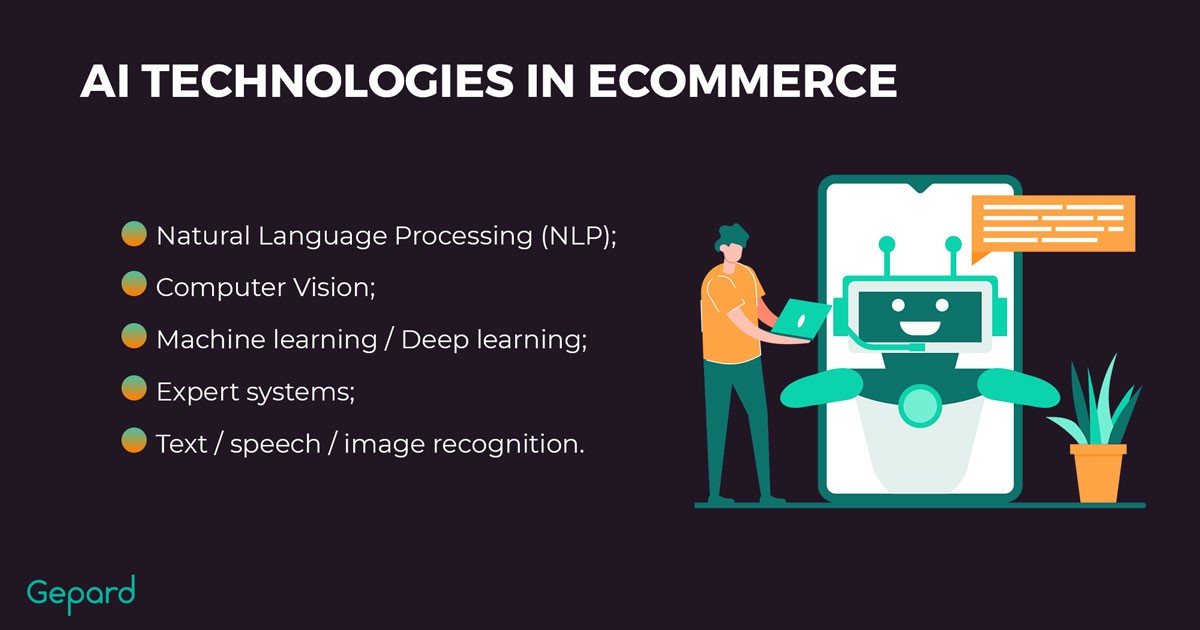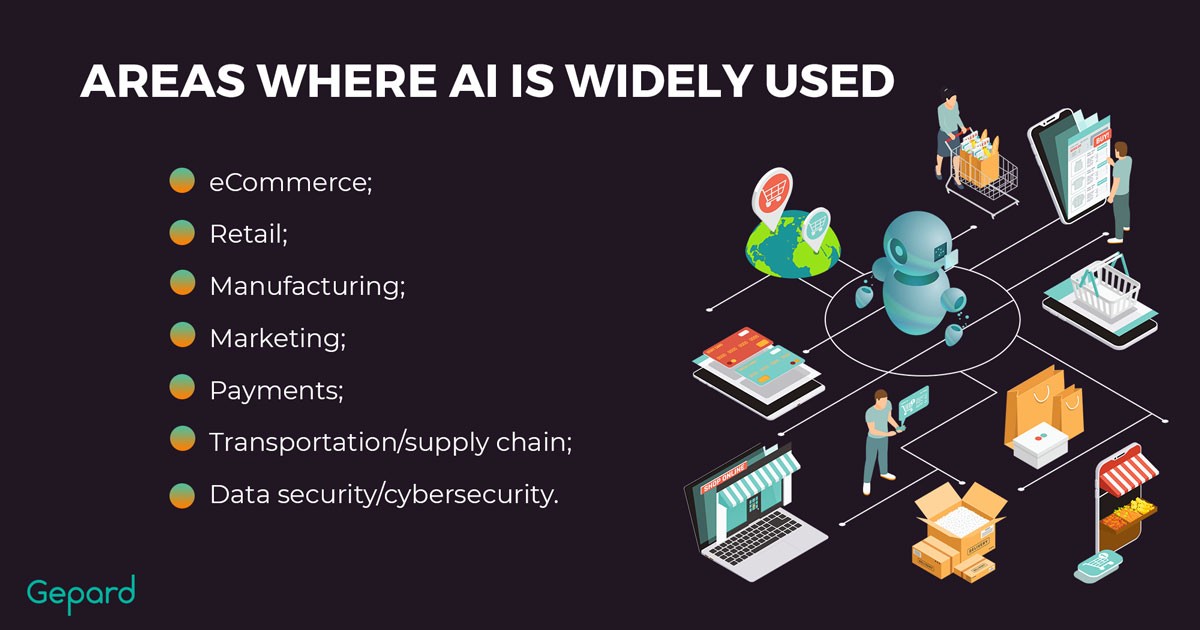AI In eCommerce: Redefining The Future
Today we would like to talk about the global changes in our lives that we don’t really notice. AI is already penetrating everywhere: search engines based on learning systems, smart mail filters, social network algorithms, etc.
Interestingly, the eCommerce sector also did not stand aside. Small online stores and marketplaces are looking for new optimization options. This is where AI comes to the rescue – a technology that automates processes and improves the quality of service.
What Is AI In eCommerce
- Reducing cart abandonment
- Delivering personalized experiences
- Making search through a store smart
With 70% of online business owners supporting and believing that AI for eCommerce will help their online shops with personalization, there is no doubt that this technology will only grow further.
What Are the Main AI Applications in eCommerce?
All of these basic AI technologies have different purposes and uses in powering online shopping.
- The main applications of NLP in eCommerce are voice-activated payments, virtual conversation, and voice searches.
- Computer vision allows face detection and identification when it comes to artificial intelligence in eCommerce.
- Chatbots use deep learning algorithms and NLP, and they can comprehend the second party’s voice and human vocabulary during the interaction.
- AI phone call assistant are used to handle customer queries over voice calls, enabling automated order tracking, returns, or support especially useful during high-demand periods or after business hours.
- Expert systems, with the help of AI, are able to make a judgment and emulate human behavior as a prime component of fraud prevention and security enhancement in eCommerce.
- Image recognition allows users to look for products online simply by taking a picture and dragging it into Google search.

How Artificial Intelligence Is Used in eCommerce & Related Business Domains
eCommerce
A smart recommendation engine for online shops works based on user behavior and offers users products they are looking for. The algorithm analyzes the user behavior patterns such as frequent product views, considerations, and purchases. Based on the analyses, the most relevant product suggestions are displayed.
Virtual dressing rooms are a type of software that helps consumers digitally try on clothing. The item can be placed over a live image of the buyer using artificial intelligence technology and is essentially acting as an enhanced shopping assistant.
Retail
Supply chain planning: AI algorithms are capable of processing and analyzing enormously large data volumes, helping retail businesses detect logistical disruptions. Research done by IBM found that 40% of companies that participated in the survey resolve supply chain challenges using AI.
Customer research: AI allows for cutting costs in performing market research and doing it more efficiently. Machine learning software is already capable of performing tasks such as finding survey respondents, analyzing open-ended replies (unstructured data), and determining what follow-up questions to ask.
Warehouse automation: Inventory processing can be powered by AI software that optimizes its operations and automates them. Online retail giant Amazon has reported that AI-powered computers help stock 40% more inventory in its warehouses. Companies such as Swisslog manufacture intralogistics systems that are capable of learning and evolving from human interactions in the plants they are installed at.
Shoppers mood tracking: AI-powered eCommerce technologies can track and detect certain consumer moods and trends, helping online shops to keep a more accurate product stock. The Very Group successfully implemented AI mood tracking technology in their machine-learning chatbot. It detects customers’ tone in messages and adjusts replies based on that information. The AI system eventually became the most used customer support channel of the company.
Manufacturing
Production process control: Combining artificial intelligence with production process control reduces cost overheads and downtime. In market research done by Capgemini, it was determined that 51% of European manufacturers use AI solutions.
Processes automation and improvement: AI technologies help reduce mundane, routine tasks that exist in manufacturing, but most importantly they can also predict accidents by analyzing volumes of data from large factory machinery. Companies such as Canon are leveraging their experience and knowledge of manufacturing automation powered by AI and are even offering consulting services to other businesses.
Equipment diagnostics: AI-powered software can perform equipment diagnostics without human interaction. This can be applied both on a large scale, for example in production lines, or for individual cars. A large number of modern vehicles come with built-in AI tools that perform automatic diagnosis of the engine and other car parts. The most prominent example is Hyundai’s AI engine fault diagnostics system that collects internal car noises, and based on that analysis of the gathered data, it makes a diagnosis with accuracy exceeding 90%.

Marketing
Personalized offers: AI tools let marketers go beyond traditional customization efforts by examining massive datasets and finding trends in customer behavior. These data findings act as reference points for decision-making during different stages of advertisement planning and help with the integration of personalized AI sales offers.
Orders/purchases management: From SKU availability checks to shipping label printing, not so long ago order managers processed these tasks practically manually. Today numerous AI-powered solutions do this task for you. Industry leaders, such as Retalon, use artificial intelligence to provide systems that do the planning, merchandising, and inventory management.
Ads automation: The process of running ads often requires collecting data from initial marketing campaigns and running them again with a more narrowed down audience targeted. Thanks to AI software, all this can now be performed automatically. Solutions such as Adext utilize machine learning algorithms that automatically are able to perform audience segmentation, budget planning, and more for Google, Facebook, and Instagram ad campaigns.
Virtual shopping assistants / virtual conversations are additional AI solutions that are assisting buyers and increasing their purchasing efficiency while also assisting businesses in gaining the insights they want in finance areas and risk management.
Payments
With 3.25 billion voice assistant devices in global use, voice-activated payments are transforming the way personal banking is done. It efficiently reduces the time it takes to do financial operations, such as signing in and activating cards, as well as making transfers and paying bills.
Supply Chain
From retail to manufacturing, transportation to storage and supply chain, efficiency influences every business. In many countries, it became a norm for shoppers to expect to get their purchases on the same day. This is possible to achieve thanks to AI implementation in the transportation industry, especially in flight delay prediction technology that is powered by AI.
Cybersecurity
An unusually high amount of login attempts often indicate a cyberattack, whereas a significant increase in credit card transactions in a short period can indicate fraud use. Due to eCommerce machine learning technologies, online shops can perform threat analysis and prevent financial cybercrime. Moreover, AI helps to prevent fraud and data theft.
How to Implement AI Technologies in eCommerce?
However, it should be noted that the process of companies transitioning to new technologies can be a real challenge. It is important to develop an algorithm and strategy that will help make this process smoother and more efficient. One of the most important things you can face is setting priorities. What problems do we want to solve with the help of AI? What processes in our business can be automated? This is the first step to take.
Then you need to select the right algorithms to solve these problems. There are now a huge number of different machine learning algorithms, neural networks, and other AI methods available. They differ in complexity, accuracy, and required resources. Choosing the right algorithm will not only help improve efficiency but will also save time and costs in their implementation.
The process of training artificial intelligence requires special attention. It seems to me that to do this you need to have enough data to train models and develop the right methodology to evaluate the results. Each algorithm requires a different approach to training, so it is important to choose the optimal method for each specific task.
Interesting fact: about 30% of sellers working on marketplaces already use AI analytics tools on a daily basis. However, it is important to understand that these tools provide only 20% of the information on the assortment matrix. The remaining 80% are conclusions and recommendations from analysts, logisticians, marketers, managers, and SEO specialists.
There is now an e-commerce ecosystem that offers a solution that eliminates human error and provides simple and specific recommendations to improve sales performance. Thus, sellers can receive not only abstract data but also practical assistance in developing their business.
In our opinion, it is important not only to implement artificial intelligence but also to develop a strategy for updating it. Artificial intelligence is constantly evolving, and we believe it is important to stay abreast of new technologies and apply them to improve your business processes. The use of artificial intelligence is simply a necessity for modern E-commerce companies. But this, of course, is a difficult and important stage in the development of any company.
AI In eCommerce FAQ
How AI Is Used in eCommerce?
AI is used in eCommerce by leveraging acquired business and customer data to make better business decisions and more accurately forecast the future. Artificial intelligence in eCommerce can help today’s online merchants create an optimal consumer experience both online and offline.

What Are The Examples Of AI In eCommerce Apps?
AI is used in eCommerce apps when shoppers use voice search, find product descriptions that are created and personalized automatically, and have search results that are individually tailored to them.
What Are The Benefits Of Artificial Intelligence In eCommerce?
The strongest benefits of AI in eCommerce come down to what generates the most revenue. Personalized product recommendations account for up to 31% of eCommerce. Of course, other benefits can’t be excluded, such as predictive marketing support, AI-powered fraud detection software that helps reduce losses, and chatbots that also save overhead costs.
How AI Is Used In Shopping?
Online retailers use AI to enhance demand predictions, price choices, and product positioning. Predictive analytics with eCommerce intelligence can assist you in the correct inventory management so that your online shop has just the right amount of certain products.
What Challenges Can Gepard Solve for Your Business?
While shopping online, visitors often make a buying decision to abandon a cart. What often causes them to stop the purchase is the cost of delivery and slow checkout processes. But another reason, which also acts as a big cause for the high abandonment rate and is often overlooked, is the lack of accurate product information. The bigger inventory an online shop has, the harder it is to manage it. The product details updates (description, images, rich content, packaging info) are frequently missed due to human error, especially when they are done manually.
These errors that have a significant impact on the revenue of a business can be easily corrected with an automation solution that Gepard PIM offers. Our unique product content optimization software simplifies the process of collecting, enriching, and pushing product information to multiple sales channels.
Equipped with the understanding of the importance of AI in eCommerce and accurate product information, you may want to work with a well-grounded solution like the one Gepard offers.
Reach out to our team of specialists to request a personalized demo of Gepard PIM.


